Related Research Articles
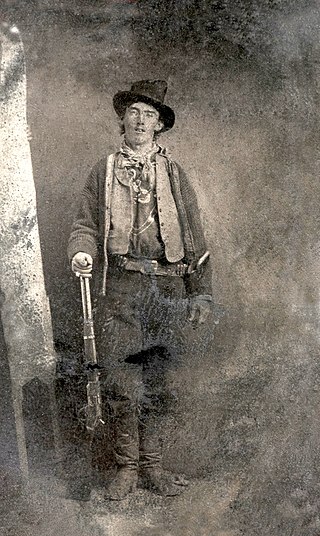
The Lincoln County War was an Old West conflict between rival factions which began in 1878 in Lincoln County, New Mexico Territory, the predecessor of the state of New Mexico, and continued until 1881. The feud became famous because of the participation of William H. Bonney. Other notable participants included Sheriff William J. Brady, cattle rancher John Chisum, lawyer and businessmen Alexander McSween, James Dolan and Lawrence Murphy.

Charles Drake was an American actor.
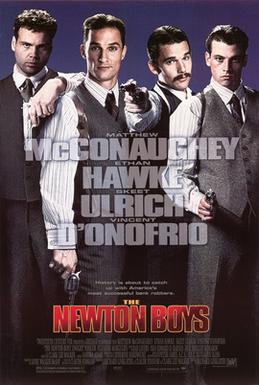
The Newton Boys is a 1998 American Western crime film directed by Richard Linklater, who co-wrote the screenplay with Claude Stanush and Clark Lee Walker. It is based on Stanush's 1994 book of the same name, which tells the true story of the Newton Gang, a family of bank and train robbers from Uvalde, Texas. The film stars Matthew McConaughey, who was actually born in Uvalde, Skeet Ulrich, Ethan Hawke, Vincent D'Onofrio, and Dwight Yoakam. It was filmed throughout Texas including the towns of Bertram, Austin, Bartlett, New Braunfels, and San Antonio.

To Hell and Back is a Technicolor and CinemaScope war film released in 1955. It was directed by Jesse Hibbs and stars Audie Murphy as himself. It is based on the 1949 autobiography of the same name and is an account of Murphy's World War II experiences as a soldier in the U.S. Army. The book was ghostwritten by his friend, David "Spec" McClure, who served in the U.S. Army's Signal Corps during World War II.

Ace High is a 1968 Italian Spaghetti Western film directed and written by Giuseppe Colizzi and starring Terence Hill, Bud Spencer and Eli Wallach. The film is the second in a trilogy that started with God Forgives... I Don't! and ended with Boot Hill.

Night Passage is a 1957 American Western film directed by James Neilson and starring James Stewart and Audie Murphy.

Patricia Crowley is an American actress. She was also frequently billed as Pat Crowley.
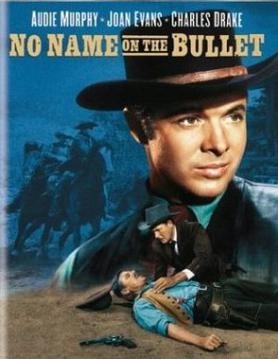
No Name on the Bullet is a 1959 American CinemaScope Western film directed by Jack Arnold, and starring Audie Murphy, Charles Drake, and Joan Evans. It is one of a handful of pictures in that genre directed by Arnold, better known for his science-fiction movies of the era. Although it is one of Universal Pictures' modestly budgeted vehicles for World War II hero Audie Murphy, the top-billed actor is unusually, but very effectively, cast as the villain, a cold-blooded gun-for-hire.

Gunsmoke is a 1953 American Western film directed by Nathan Juran and starring Audie Murphy, Susan Cabot, and Paul Kelly. The film has no connection to the contemporary radio and later TV series of the same name. The film was based on the 1951 novel Roughshod by Norman A. Fox.
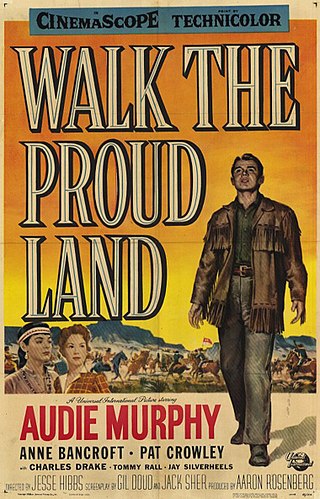
Walk the Proud Land is a 1956 American CinemaScope Technicolor Western film directed by Jesse Hibbs and starring Audie Murphy and future Academy Award winner Anne Bancroft. Filmed at Old Tucson Studios, it recounts the first successful introduction of limited self-government by John Clum (1851–1932), Indian agent for the San Carlos Apache Indian Reservation in the Arizona Territory and is based on the 1936 biography Apache Agent by his son Woodworth Clum (1878-1946).

Posse from Hell is a 1961 American Western film directed by Herbert Coleman and starring Audie Murphy and John Saxon.
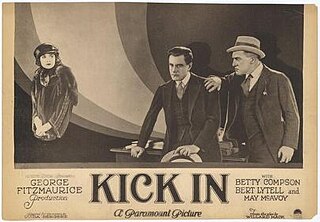
Kick In is a 1922 American silent crime drama film produced by Famous Players–Lasky, distributed by Paramount Pictures, and starring Betty Compson and Bert Lytell. The picture was directed by George Fitzmaurice, who previously directed a 1917 film version of the story. Both films are based on Willard Mack's 1913 play that was produced on Broadway in 1914 starring John Barrymore. The supporting cast features Charles Ogle, who had played the first screen Frankenstein's monster in the original 1910 version of Frankenstein.
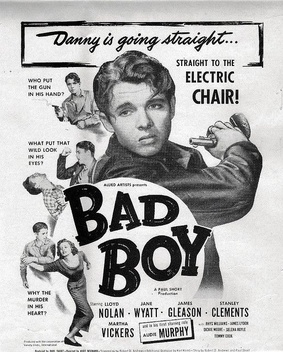
Bad Boy is a 1949 American drama film directed by Kurt Neumann and starring Audie Murphy, Lloyd Nolan and Jane Wyatt. It was Murphy's first leading role. It was distributed by the independent studio Allied Artists.

Queen of the Mob is a 1940 American film, directed by James P. Hogan.

Hell Bent for Leather is a 1960 American CinemaScope Western film directed by George Sherman and starring Audie Murphy, Felicia Farr, Stephen McNally and Robert Middleton. The film was based on the 1959 novel Outlaw Marshal by Ray Hogan and filmed on location in the Alabama Hills of Lone Pine, California.

Gunfight at Comanche Creek is a 1963 American Western film directed by Frank McDonald and starring Audie Murphy.

The Quick Gun is a 1964 American Techniscope Western film directed by Sidney Salkow and starring Audie Murphy. It was the second of four films produced by Grant Whytock and Edward Small's Admiral Pictures in the 1960s.

Bullet for a Badman is a 1964 American Western film directed by R. G. Springsteen and starring Audie Murphy and Darren McGavin. The film is based on the 1958 novel Renegade Posse by Marvin H. Albert. The film was shot between October and November 1963 in Zion National Park and Snow Canyon State Park in Utah.

A Time for Dying is a 1969 American Western film written and directed by Budd Boetticher with a cameo role by Audie Murphy, who also produced the film, as Jesse James. It was Murphy's last film, as well as the final dramatic feature for Boetticher.
Ten Wanted Men is a 1955 American Western film directed by Bruce Humberstone and starring Randolph Scott.